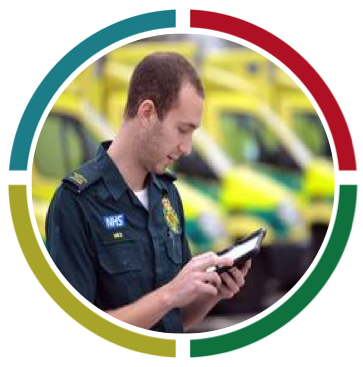 Title
Title
ERA - Electronic Records in Ambulances to support the shift to out of hospital care: challenges, opportunities and workforce implications.
Principal / Lead investigator
- Dr Alison Porter, Swansea University
Co-investigators / research team
- Professor Niro Siriwardena, University of Lincoln
- Prof Helen Snooks, Swansea University
- Dr Bridget Wells, Swansea University
- Dr Henry Potts, University College London
- Professor Suzanne Mason, University of Sheffield
- Professor Jeremy Dale, University of Bristol
- Mr Robin Lawrenson, Scottish Ambulance Service
- Mr Robert Harris-Mayes, Service User
- Professor Ronan Lyons, Swansea University
- Mrs Sarah Black, South Western Ambulance Services NHS Foundation Trust
- Mr Richard Whitfield, Welsh Ambulance Services NHS Trust
- Dr Zoe Morrison, University of Aberdeen
Type of study
Observational
Summary
Ambulance services have a vital role in the shift towards the delivery of health care out of hospitals, when this is better for patients, by offering alternatives to transfer to the emergency department (ED). The introduction of information technology (IT) in ambulance services to electronically capture, interpret, store and transfer patient data can support out of hospital care.
Objective: We aimed to understand how electronic health records (EHR) can be most effectively implemented in a pre-hospital context, in order to support a safe and effective shift from acute to community-based care, and how their potential benefits can be maximised.
Design and setting: We carried out a study using multiple methods and with four work packages (WPs): a rapid literature review; a telephone survey of all 13 freestanding UK ambulance services; detailed case studies examining EHR use through qualitative methods and analysis of routine data in four selected sites consisting of UK ambulance services and their associated health economies; and a knowledge sharing workshop.
Results: We found limited literature on EHR. Only half the UK ambulance services had EHR in use at the time of data collection, with considerable variation in hardware and software and some reversion to paper as services transitioned between systems. The case studies found that the case study ambulance services’ EHR were in a state change. Not all patient contacts resulted in generation of EHR. Ambulance clinicians were dealing with partial or unclear information, which may not fit comfortably with the EHR. They continued to use indirect data input approaches (such as first writing on a glove) even when using EHR. The primary function of EHR in all services seemed to be as a store for patient data. There was, as yet, limited evidence of their full potential being realised to transfer information, support decision making or change patient care.
Conclusions: To realise all the benefits of EHR requires engagement with other parts of the local health economy, and dealing with variations between providers and the challenges of interoperability. Clinicians and data managers, and those working in different parts of the health economy, are likely to want very different things from a data set, and need to be presented with only the information that they need.
Future work: There is scope for future work analysing ambulance service routine datasets, qualitative work to examine transfer of information at the emergency department and patients’ perspective on record keeping, and to develop and evaluate feedback to clinicians based on patient records.
Who is the study sponsor?
Swansea University
Does the study involve commercial partnership activity?
UKCRN portfolio number (if relevant)
Funder
NIHR (Health Services & Delivery Research)
Total grant value
£ 380,318
Amount accruing to Wales
£ 204,860
Start date
01/01/2016
End date
31/12/2018
How could this research potentially benefit patients?
All ambulance services are looking for ways to keep people safely away from hospital, and the Department of Health and the devolved governments are keen for them to do this. Our study will help ambulance services to get a better understanding of the best way to do this with the help of technology.
Further information (e.g. related web link)
Study summary on NHIR website: http://www.nets.nihr.ac.uk/projects/hsdr/144722
Outputs generated (Reports / Publications / Impact)
Poster presentation: 'Electronic records in ambulances - an observational study' presented at HSRUK 2019.
Poster presentation: 'No observation without participation: reflection on gathering qualitative data in emergency ambulances' presented at EMS2019, Madrid, 26-28 April 2019
Poster presentation: 'Predictors of generation of electronic patient clinical records: analysis of routine data from our UK emergency ambulance services' presented at EMS2019, Madrid, 26-28 April 2019

